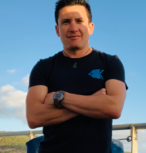DNA reveals the past and future of coral reefs
New DNA techniques are being used to understand how coral reacted to the end of the last ice age in order to better predict how they will cope with current changes to the climate. James Cook Univer

From 2005 to 2022, the main node of the ARC Centre of Excellence for Coral Reef Studies was headquartered at James Cook University in Townsville, Queensland (Australia)








Abstract:
Ocean warming and acidification are challenging the tolerance limits of scleractinian corals. However, beneficial acclimation and stress-hardening via phenotypic plasticity may be pathways to buffer some negative phenotypic effects and improve thermal tolerance. In my thesis, I explored and experimentally tested the response of different life stages of the coral Acropora loripes to two different levels of combined temperature and pCO2 predicted for this century. The assessment included a range of phenotypic traits evaluated on the coral host and associated symbionts (Symbiodiniaceae and bacteria). I found strong evidence for beneficial acclimation and hardening of photosynthetic efficiency, but not in coral growth rate. Photosynthetic efficiency declined in climate change conditions, but was restored in juvenile and adult fragments that had previously experienced climate change conditions. Furthermore, prior exposure to climate change conditions induced thermal hardening that enhanced tolerance to extreme temperatures in both juveniles and adult fragments.. Coral host, rather than experimental treatment, explained the majority of variation in the community structure of symbionts. My thesis highlights both the potential and limitations of the acclimatory response of corals facing climate change conditions under laboratory conditions, and provides insights for its potential applicability to enhance future reef model projections and restoration strategies.
Biography:
Jose was born in Rio de Janeiro – Brazil but grew up in Quito – Ecuador. He finished his B.Sc. in Biotechnology Engineering (Hns) in Ecuador in 2013 in collaboration with the University of Florida (i.e., hybridization occurring in endemic trees in the Andes region). He then decided to take a new challenge in Marine Science, which brought him to Townsville. For his M.Sc. (2014-2016) Jose worked on a molecular protocol to target ssRNA viruses infecting Symbiodiniaceae), under the supervision of Prof. Madeleine van Oppen, Dr. Karen Weynberg and Prof. Bette Willis. He started his Ph.D. with AIMS and the Centre of Excellence for Coral Reef studies in 2016, working under the supervision of Dr. Line Bay, Prof. Madeleine van Open, Prof. Philip Munday and Dr. Nicole Webster.
New DNA techniques are being used to understand how coral reacted to the end of the last ice age in order to better predict how they will cope with current changes to the climate. James Cook Univer
A new study on the effects of climate change in five tropical countries has found fisheries are in more trouble than agriculture, and poor people are in the most danger. Distinguished Profess
James Cook University researchers have found brightly coloured fish are becoming increasingly rare as coral declines, with the phenomenon likely to get worse in the future. Christopher Hemingson, a
Researchers working with stakeholders in the Great Barrier Reef region have come up with ideas on how groups responsible for looking after the reef can operate more effectively when the next bleaching
Abstract: As marine species adapt to climate change, their heat tolerance will likely be under strong selection. Individual variation in heat tolerance and its heritability underpin the potential fo
Abstract: The Reef Ecology Lab in KAUST’s Red Sea Research Center explores many aspects of movement ecology of marine organisms, ranging from adult migrations to intergenerational larval dispersal
Abstract: Macroalgal meadows are a prominent, yet often maligned component of the tropical seascape. Our work at Ningaloo reef in WA demonstrate that canopy forming macroalgae provide habitat for ad
Abstract: Sharks are generally perceived as strong and fearsome animals. With fossils dating back at least 420 million years, sharks are not only majestic top predators but they also outlived dinosa
Abstract: Connectivity plays a vital role in many ecosystems through its effects on fundamental ecological and evolutionary processes. Its consequences for populations and metapopulations have been
Abstract: Evolution of many eukaryotic organisms is affected by interactions with microbes. Microbial symbioses can ultimately reflect host’s diet, habitat range, and even body shape. However, how
Abstract: The past few years have seen unprecedented coral bleaching and mortality on the Great Barrier Reef (GBR) but the consequences of this on biodiversity are not yet known. This talk will expl